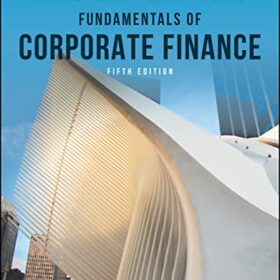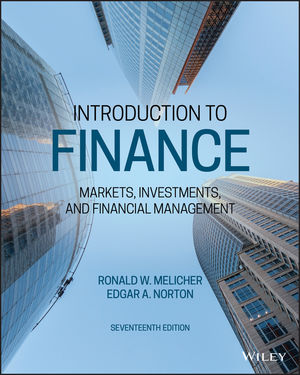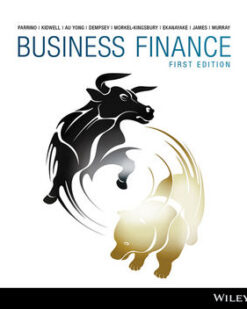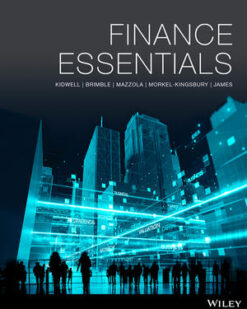Description
TABLE OF CONTENTS
Preface iv
Author Bios xii
Part 1 Institutions and Markets
1 The Financial Environment 5
1.1 What is Finance? 6
1.2 Why Study Finance? 8
1.3 Six Principles of Finance 10
1.4 Overview of the Financial System 13
1.5 Financial Markets: Characteristics and Types 17
1.6 Careers in Finance 18
1.7 The Plan of Study 20
Applying Finance To. . . 21
Summary 21
Key Terms 22
Review Questions 22
Exercises 22
2 Money and the Monetary System 24
2.1 The 2007–2008 Financial Crisis and Subsequent Recovery 25
2.2 Process of Moving Savings into Investments 26
2.3 Overview of the Monetary System 28
2.4 Characteristics and Functions of Money 29
2.5 Development of Money in the United States 31
2.6 Money Market Securities 37
2.7 Measures of the U.S. Money Supply 38
2.8 Money Supply and Economic Activity 41
2.9 International Monetary System 42
Applying Finance To. . . 44
Summary 44
Key Terms 45
Review Questions 45
Exercises 46
Problems 47
3 Banks and Other Financial Institutions 49
3.1 Financial Institution Problems During the 2007–2008 Financial Crisis 50
3.2 Types and Roles of Financial Institutions 51
3.3 Overview of the Banking System 55
3.4 Historical Development of the U.S. Banking System 58
3.5 Regulation of the Banking System 60
3.6 Structure of Banks 65
3.7 The Bank Balance Sheet 66
3.8 Bank Management 71
3.9 International Banking and Foreign Systems 75
Applying Finance To. . . 76
Summary 77
Key Terms 78
Review Questions 78
Exercises 79
Problems 79
4 Federal Reserve System 82
4.1 U.S. Central Bank Response to the Financial Crisis and Great Recession 83
4.2 The U.S. Banking System Prior to the Fed 84
4.3 Structure of the Federal Reserve System 86
4.4 Monetary Policy Functions and Instruments 92
4.5 Fed Supervisory and Regulatory Functions 99
4.6 Fed Service Functions 101
4.7 Central Banks in Other Countries 103
Applying Finance To. . . 104
Summary 104
Key Terms 105
Review Questions 105
Exercises 106
Problems 107
5 Policy Makers and the Money Supply 109
5.1 National Economic Policy Objectives 110
5.2 Four Policy Maker Groups 112
5.3 Government Influence on the Economy 114
5.4 Treasury Cash and General Management Responsibilities 116
5.5 Treasury Deficit Financing and Debt Management Responsibilities 120
5.6 Changing the Money Supply 122
5.7 Factors Affecting Bank Reserves 128
5.8 The Monetary Base and the Money Multiplier 131
Applying Finance To. . . 133
Summary 133
Key Terms 134
Review Questions 134
Exercises 135
Problems 135
6 International Finance and Trade 137
6.1 International Monetary System 138
6.2 European Unification 140
6.3 Currency Exchange Markets and Rates 142
6.4 Factors that Affect Currency Exchange Rates 145
6.5 Conducting Business Internationally 149
6.6 Financing International Trade 151
6.7 Developments in U.S. International Transactions 157
Applying Finance To. . . 161
Summary 161
Key Terms 162
Review Questions 162
Exercises 163
Problems 164
6.8 Exchange Rate Risks in Global Business 166
Hedging Cash Flows 167
Speculating or Taking Educated Guesses on Exchange Rate Movements 168
Where to Invest? 168
Summary 169
Review Questions 170
Part 2 Investments
7 Savings and Investment Process 173
7.1 Gross Domestic Product and Capital Formation 174
7.2 Federal Government Receipts and Expenditures 177
7.3 Role and Major Sources of Savings 180
7.4 Factors Affecting Savings 184
7.5 Capital Market Securities 187
7.6 Mortgage Markets 189
7.7 Role of the Individual in the 2007–2008 Financial Crisis and Today 191
Applying Finance To. . . 193
Summary 193
Key Terms 194
Review Questions 194
Exercises 195
Problems 195
8 Interest Rates 197
8.1 Supply and Demand for Loanable Funds 198
8.2 Components of Market Interest Rates 203
8.3 Default Risk-Free Securities:
8.4 Term or Maturity Structure of Interest Rates 210
8.5 Inflation Premiums and Price Movements 213
8.6 Default Risk Premiums 218
Applying Finance To. . . 220
Summary 220
Key Terms 221
Review Questions 221
Exercises 222
Problems 223
9 Time Value of Money 225
9.1 Basic Time Value Concepts 226
9.2 Compounding to Determine Future Values 228
9.3 Discounting to Determine Present Values 232
9.4 Finding Interest Rates and Time Requirements 237
9.5 Future Value of an Annuity 239
9.6 Present Value of an Annuity 242
9.7 Interest Rates and Time Requirements for Annuities 245
9.8 Determining Periodic Annuity Payments 247
9.9 More Frequent Time Intervals and the Cost of Consumer Credit 249
Applying Finance To. . . 252
Summary 253
Key Terms 253
Review Questions 254
Exercises 254
Problems 254
9.10 Annuity Due Problems 257
Future Value of an Annuity Due 257
Present Value of an Annuity Due 258
Interest Rates and Time Requirements for Annuity Due Problems 259
Summary 260
Questions and Problems 260
10 Bonds and Stocks: Characteristics and Valuations 262
10.1 Long-Term External Financing Sources for Businesses 263
10.2 Bonds 264
10.3 Different Types of Bonds 271
10.4 Corporate Equity Capital 275
10.5 Dividends and Stock Repurchases 279
10.6 Valuation Principles 283
10.7 Valuation of Bonds 286
10.8 Valuation of Stocks 293
Applying Finance To. . . 298
Summary 298
Key Terms 299
Review Questions 300
Problems 301
10.9 Holding Period Returns 305
Annualized Rates of Return 305
Summary 307
Problems 307
11 Securities and Markets 308
11.1 Issuing Securities: Primary Securities Markets 309
11.2 The Facebook IPO 313
11.3 Other Ways to Assist Issuing Firms 316
11.4 Cost of Going Public 318
11.5 Investment Banking Firms: Other Functions Innovations Regulations 321
11.6 Trading Securities – Secondary Securities Markets 323
11.7 Security Transactions 326
11.8 Over-the-Counter Market 330
11.9 What Makes a Good Market? 331
11.10 Security Market Indexes and Trading Foreign Securities 333
11.11 Inside Information and Other Ethical Issues 336
Applying Finance To. . . 338
Summary 339
Key Terms 340
Review Questions 341
Problems 341
11.12 Why Do Derivatives Exist? 344
Futures Contracts 345
Options 346
Option Profit/Loss Diagrams 349
Summary 350
Key Terms 350
Discussion Questions 350
Problems 351
12 Financial Return and Risk Concepts 352
12.1 Historical Return for a Single Financial Asset 353
12.2 Historical Risk Measures for a Single Financial Asset 355
12.3 Where Does Risk Come from? 358
12.4 Expected Measures of Return and Risk 360
12.5 Historical Returns and Risk of Different Assets 364
12.6 Efficient Capital Markets 365
12.7 Portfolio Returns 368
12.8 Variance and Standard Deviation of Return On a Portfolio 369
12.9 Portfolio Risk and the Number of Investments in the Portfolio 372
12.10 Capital Asset Pricing Model 374
Applying Finance To. . . 378
Summary 378
Key Terms 379
Review Questions 379
Problems 380
12.11A Estimating Beta 384
12.11B Security Market Line 386
Summary 387
Problems 387
Part 3 Financial Management
13 Business Organization and Financial Data 391
13.1 Starting a Business 392
13.2 Forms of Business Organization in the United States 394
13.3 Accounting Principles 398
13.4 Income Statement 401
13.5 The Balance Sheet 402
13.6 Statement of Cash Flows 405
13.7 Financial Statements of Different Companies 407
13.8 Goal of a Firm 410
13.9 Corporate Governance 414
13.10 Finance in the Organization Chart 418
Applying Finance To. . . 420
Summary 420
Key Terms 421
Review Questions 421
Problems 422
13.11A Income Tax 427
13.11B Depreciation Basics 429
13.11.1 A Few Words on Depreciation Methods 430
Summary 431
Review Questions and Problems 431
14 Financial Analysis and Long-Term Financial Planning 432
14.1 Financial Statement Analysis 433
14.2 Liquidity Ratios and Analysis 436
14.3 Asset Management Ratios and Analysis 438
14.4 Financial Leverage Ratios and Analysis 441
14.5 Profitability Ratios and Analysis 445
14.6 Market Value Ratios and Analysis 447
14.7 Dupont Method of Ratio Analysis 449
14.8 Long-Term Financial Planning 452
14.9 Cost–Volume–Profit Analysis 455
14.10 Degree of Operating Leverage 456
Applying Finance To. . . 458
Summary 459
Key Terms 460
Review Questions 460
Problems 461
15 Managing Working Capital 466
15.1 Importance of Working Capital 467
15.2 Operating and Cash Conversion Cycles 468
15.3 Investments in Receivables Inventory and Payable Financing 472
15.4 Cash Budgets 475
15.5 Management of Current Assets 480
15.6 Getting – and Keeping – the Cash 488
15.7 Accounts Receivable Management 490
15.8 Inventory Management 494
15.9 Technology and Working Capital Management 495
Applying Finance To. . . 497
Summary 497
Key Terms 498
Review Questions 498
Problems 499
16 Short-Term Business Financing 503
16.1 Strategies for Financing Working Capital 504
16.2 Factors Affecting Short-Term Financing 507
16.3 Providers of Short-Term Financing 512
16.4 Nonbank Short-Term Financing Sources 516
16.5 Additional Varieties of Short-Term Financing 521
16.6 Inventory Financing and Other Secured Loans 525
16.7 The Cost of Short-Term Financing 527
Applying Finance To. . . 528
Summary 528
Key Terms 529
Review Questions 530
Problems 530
17 Capital Budgeting Analysis 533
17.1 Mission, Vision, and Capital Budgeting 534
17.2 Capital Budgeting Process 537
17.3 Capital Budgeting Techniques – Net Present Value 540
17.4 Capital Budgeting Techniques – Internal Rate of Return 543
17.5 Capital Budgeting Techniques – Modified Internal Rate of Return 547
17.6 Capital Budgeting Techniques – Profitability Index 549
17.7 Capital Budgeting Techniques – Payback Period 549
17.8 Conflicts Between Discounted Cash Flow Techniques 550
17.9 Estimating Project Cash Flows 552
17.10 Keeping Managers Honest 558
17.11 Risk-Related Considerations 559
Applying Finance To. . . 561
Summary 561
Key Terms 563
Review Questions 563
Problems 564
17.12 Project Stages and Cash Flow Estimation 567
Initial Outlay 567
Cash Flows During the Project’s Operating Life 568
Salvage Value and NWC Recovery at Project Termination 568
17.13 Applications 569
Cash Flow Estimation for a Revenue Expanding Project 569
Cash Flow Estimation for a Cost-Saving Project 571
Setting a Bid Price 574
Summary 576
Review Questions 576
Problems 576
18 Capital Structure and the Cost of Capital 578
18.1 Why Choose a Capital Structure? 579
18.2 Required Rate of Return and the Cost of Capital 582
18.3 Cost of Capital 583
18.4 Weighted Average Cost of Capital 587
18.5 Planning Growth Rates 592
18.6 EBIT/eps Analysis 594
18.7 Combined Operating and Financial Leverage Effects 597
18.8 Insights from Theory and Practice 601
Applying Finance To. . . 607
Summary 607
Key Terms 608
Review Questions 609
Problems 610
Appendix A-1
Glossary G-1
Index I-1






